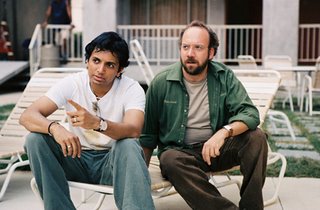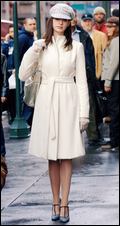Lady in the Water
I suspect a lot of the problem is the one-man-bandedness of his works. He writes and directs all his movies, so all the blame or praise falls to him. In this case, was it a blessing or a curse that Sixth Sense (1999) was his first feature film?

Ok. Lady in the Water (2006). Paul Giamatti plays Cleveland Heap, a put-upon apartment complex superintendeant that seems somewhat contented to work and live with the miscellaneous characters that occupy the building. Like the weird little dude who is only working out one side of his body. Or the family with five sisters. The war buff. The film critic who clumsily analyses his life as if it were a film. The author and his sister. More on the author later.
Bryce Dallas Howard plays a sea nymph who appears in the pool of Cleveland’s complex. Yeah. I tried to care about/pay attention to this storyline, so bear with me. A long time ago, humans and sea creatures were friendly, but then men became more obsessed with owning material objects, and didn’t care about the sea creatures anymore. Uh, star babies of the sea nymphs were sent to live among men and if they could spiritually commune with one, or something, something good would happen.
My confusion or ambivalence on the storyline is fuelled by multiple amendments and addendums to the original story as the movie progressed. It’s like this, oh, no it’s not, it’s like this, oh, did I forget to say this? It gets tiring and boring really fast. How lazy was Shyamalan when he was writing this screenplay that he didn’t even try to insinuate story twists with any sort of finesse? They are slammed into the proceedings like a lump of clay thrown on the floor.
I liked the directing. The direction was cool. Shyamalan likes to frame his subjects very tightly, so the audience can’t see what the character sees, or, what the character can’t see. It’s a very effective tool in suspenseful directing. He knows that what you can’t see is often more frightening than what you can. Still, he showed us the aliens in Signs (2002). It was scary up to that point.
 Paul Giamatti is an amazing actor. He is not a big screen hunk, and he doesn’t choose broadly funny roles, but he is captivating to watch with excellent comic timing. In Lady in the Water, his Cleveland stutters. Giamatti portrays stuttering with understanding and style. It’s not the stereotypical broken-record uncontrollable repetition of the first phoneme (“puh-puh-puh-puffed sleeves”), but the kind of unpredictable and troubled speech from which so many stutterers suffer. I just remembered: stuttering was mentioned in The Sixth Sense, too.
Paul Giamatti is an amazing actor. He is not a big screen hunk, and he doesn’t choose broadly funny roles, but he is captivating to watch with excellent comic timing. In Lady in the Water, his Cleveland stutters. Giamatti portrays stuttering with understanding and style. It’s not the stereotypical broken-record uncontrollable repetition of the first phoneme (“puh-puh-puh-puffed sleeves”), but the kind of unpredictable and troubled speech from which so many stutterers suffer. I just remembered: stuttering was mentioned in The Sixth Sense, too.I said I’d get back to the author. He is played by Shyamalan, in his biggest role to date. (Until now, he’d taken a page out of Hitchcock's book, which is called “Appearing in Your Own Film.” He was only a tiny glimpse or cameo in his other films, but in Lady in the Water, it’s a proper role.) His character, when played by himself, and the plotline he has given Vic, is probably one of the most self-serving and egotistic turns I’ve ever witnessed. The Nymph (whose name, annoyingly, is “Story”), tells him that the book he’s in the process of writing will influence the future president of the United States, and will bring about an era of world peace. Oh, and he’d be murdered because of his ideas. Posthumous glory. How tragic. Is Shyamalan trying to say that we’ll only really appreciate his movies when he’s dead? That’s a tall order when it comes to this offering.
Everyone said it was crap, but I went to see it anyway. I should learn my lessons. Rotten Tomatoes gave this movie 21%. 15% of that is Giamatti, and 6% is for the line, “Mr. Heap is a player!”





